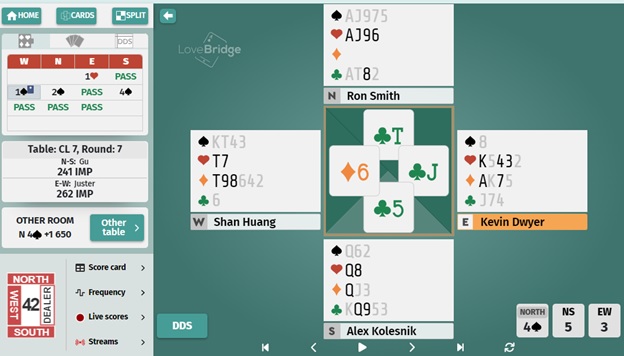Board 42, Closed Room, Segment 7 of the 2024 Open USBC USA match between Gu and Juster
Table Director: Chris Wiegand
Table Result: 4S N -3 -300
Committee Result: Table result stands. 4♠ N -300

The play to 4♠ was as follows:
1. ♦K, 3, 5 ♠5
2. ♣2 ,7, K, 6
3. ♠2, 3, J, 8
4. ♠A, ♥2, 6, 4
5. ♣A, 4, 3, ♠T
6. ♠K, 7, ♥5, ♠Q
7. ♦4, ♠9, ♦5 ♦J
8. ♣T, ♣J, ♣5*, ♦6
At this juncture, the director was summoned to the table. Declarer claimed that he misclicked because
he could not see (declarer does suffer from vision issues) and intended to play the ♣Q, not the ♣5.
At this juncture, the director was summoned to the table. Declarer claimed that he misclicked because
he could not see (declarer does suffer from vision issues) and intended to play the ♣Q, not the ♣5.
Director’s Determination of Facts:
• The card played (♣5) was not immediately adjacent to the card asserted as intended (♣Q) on the
screen.
• Declarer was using a mouse rather than the touchpad or a stylus on the touchscreen.
• Declarer has our recommended settings of Drag-and-Drop turned on. This means that declarer
clicked on the C5 and dragged it to the target in the middle of the table, waited until the target
changed color, and released the card. (It is similar in face-to-face play to a declarer reaching
across to pick up the ♣5 and put it in the “middle” of the table.)
Relevant USBF Regulations
USBF General Conditions
XIV.SPECIAL RULES FOR ELECTRONIC FACE-TO-FACE PLAY
D. Undos for Misclicks Will be Allowed
Any player who accidentally clicks on the wrong bid or card (“misclick”) may ask for an undo
and shall summon the director to rule on whether it should be allowed. The request for an undo
must be made before the partner of the person requesting the undo has acted.
G. Modification of Laws
LAWS 45, 46, and 47: An unintended played card (“misclick”) by declarer or a defender will be
treated as in Law 45D1: The card must be withdrawn if attention is drawn to it before each side
has played to the next trick; cards played subsequent to the unintended played card may be
withdrawn. Information from all such withdrawn cards is deemed to be unauthorized to the side
with the unintended played card, and authorized to the other side.
Table Director’s Ruling:
Prior to making the table ruling, the Director inquired as to how declarer would play the hand if the card
played were changed to the ♣Q. Declarer gave his assertions about the play at that point and his
intended line (see second bullet below).
Per Law 45.C.3 [CARD PLAYED.Card Deemed to be Played]
A card in the dummy is played if it has been deliberately touched by declarer except for the purpose
either of arranging dummy’s cards, or of reaching a card above or below the card or cards touched.
The director ruled that the actions required to maneuver the card into the middle of the table showed
“deliberate touching.” Further, since they were not adjacent (a card to the left or right of intended card
when the Law is translated to the playing environment), it was determined that the ♣5 was played.
Director resumed play with the ♣5 played at that point.
Appeal:
Appellant Smith (in consultation with partner, Kolesnik and team captain Gu) asked for an
appeal of the director’s determination about intent of the card played. Smith asserted the following:
• Recent eye problems (well-documented) make vision difficult, and he has trouble seeing the
cards.
• At the time of the incident, he had already solved the problem of the hand (“run the clubs in
dummy then end East (opening bidder) with the ♦A so that he would have to lead from his ♥K”).
• This makes the declarer’s intent clear that he intended the ♣Q not the ♣5.
Committee’s Decision*:
The committee analyzed that there were two items to consider:
1) The applicable laws for the ruling of whether the ♣Q or the ♣5 should be played
(slip of the hand vs slip of concentration), subject to USBF Conditions of Contest and
2) only IF they would allow the ♣Q play, what the likely result would be, and potentially
weighted results based upon likely play at that point.
The committee reviewed relevant laws and asked about prior rulings/case law about the way these
situations were handled. DiC Myers asserted that as a general rule, we would allow the adjacent card to
be changed, but not a card that was two or more away from the intended card. Further, they practiced
the action of dragging and dropping with a mouse on a device. It was the determination of the
committee that the play of ♣5 was more likely to be a slip of concentration than a slip of the mouse.
Table result stands. The appeal was considered to have merit.
* Note that since the incident occurred relatively late in the 7th segment of 8, play resumed for 8th
segment while the Committee held their deliberations. TD McKenzie Myers asserted the above bullet
points with complainant Smith’s permission.
Appeal Committee: Brad Moss, Chip Martel, Will Watson
